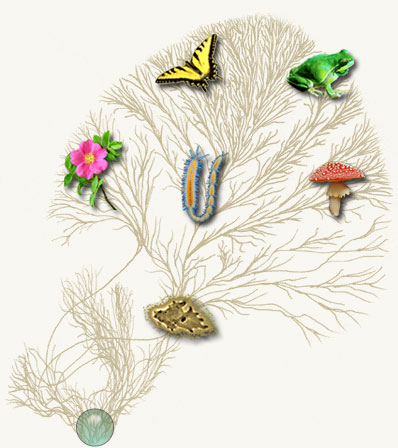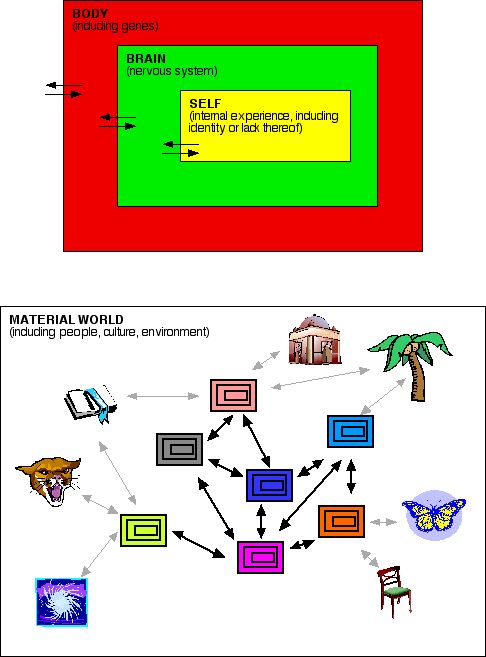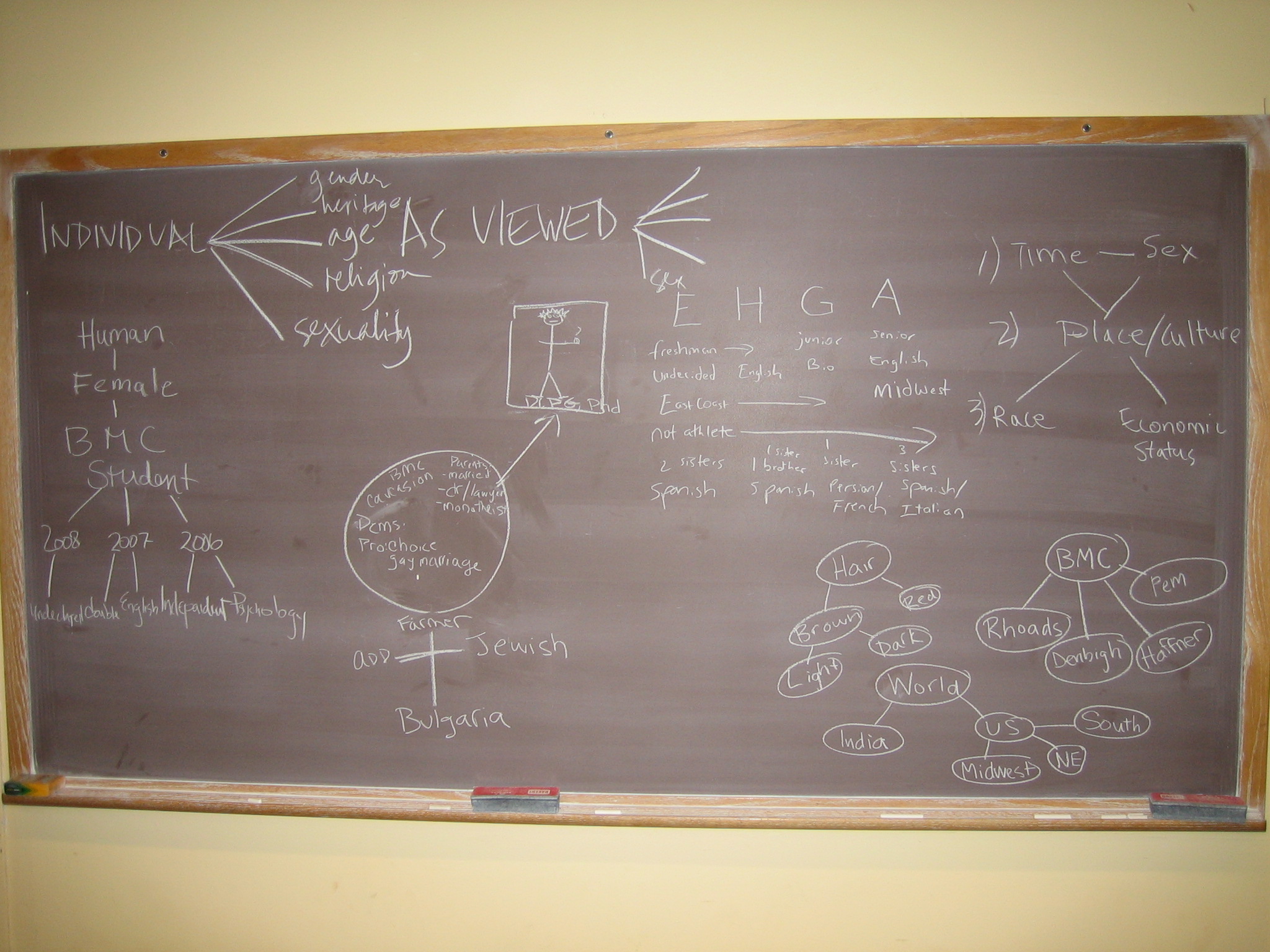Story of Evolution/Evolution of Stories
Bryn Mawr College
March 28, 2005
More on Story Telling "Styles" and Preferences
... Herculine Barbin

Michel Foucault
Foucault's Ideas (Dangerous and Otherwise):
A Meditation on Categorization

What is Foucault seeing? What are you seeing?
From ArtLex on Mythology
What happened to the minotaur over time? (What did Picasso see?)

Pablo Picasso (1881-1967), Minotaur Caressing a Sleeping Woman, from ArtLex Art Dictionary
From Middlesex, pp. 107-108, pp. 430-432:
"No reason to mention my peculiarities, my wandering in the maze these many years, shut away from sight. And from love, too.
The Simultaneous Fertilization had occurred in the early morning hours of March 24, 1923, in separate, vertical bedrooms, after a night out at the theater. My grandfather...had splurged on four tickets to The Minotaur....A momentous night, this, for all involved....I want to record the positions...and the circumstances...and the direct cause (a play about a hybrid monster)....
While my parents were being given a crash course on gonadogenesis, I...was doing some homework myself. In the Reading Room of the New York Public Library I was looking up something in the dictionary....
hypospadias-
An abnormality of the penis in which the urethra opens on its under surface.
See synonyms at EUNUCH.
I did as instructed and got
eunuch-- A man whose testes have not developed.
See synonyms at HERMAPHRODITE.
Following where the trail led, I finally reached
hermaphrodite--Anything comprises of a combination of diverse or contradictory elements.
See synonyms at MONSTER....
There is was, monster, in black and white, in a battered dictionary in a great city library....Here was a book that contained the collected knowledge of the past while giving evidence of present social conditions....The synonym was official, authoritative; it was the verdict that the culture gave on a person like her. Monster. That was what she was....For a second Callie saw herself that way. As a lumbering, shaggy creature pausing at the edge of woods. As a humped convolvulus rearing its dragon's head from an icy lake....the synonym pursued her....Webster's Dictionary kept calling after her, Monster, Monster!"
I want to take some time with this idea:
the power of words, the usefulness (for getting us out of the labyrinth?)
and destructiveness (in separating us from one another?) of categorization.
And I want us to start,
not with the Eugenides' text,
and not with Darwin's theory of common descent...

From Tree of Life Web Project
but with ourselves:
What categories do each of us occupy?
What words do we use to describe ourselves?
What words do others use to describe us?
How do the categories "inside" differ from those "without"?

GoPhila CultureFiles--Mutter Museum
Is our occupation of categories willing or unwilling? "Natural" or imposed?
What do those categories (say, "learner" and "teacher") signify to us?
What do they look and sound like to each of us?
What categories matter most to us,
when we discuss our own identities and those of others?
How might we self-organize into a taxonomy that makes sense of those identities?
For help, go to Taxonomy--Wikipedia
Taxonomy Lab: The "Nuts and Bolts" of Taxonomy and Classification
Bloom's Taxonomy: A Classification of Levels of Intellectual Behavior

The Wagner Free Institute of Science
So--split into groups of five to conduct this taxonomic exercise:
How many "kinds" do you constitute?
What are the grounds for your grouping?
(Identify any/all characteristics that seem important to you.)
Identify a table, or grid, or draw a tree...

From
Does Biology Have Anything to Contribute to Thinking About Sex and Gender?
...that places you in relation to one another.
What matters in the categories you make?
How do you construct them?

So...what have we learned?
For starters: categorization can begin
- "platonically": from the "top-down"
(with the catagories, into which we then put ourselves.
But how many categories can each of us occupy simultaneously?
If we were building a "science museum," how many rooms would feature you?)
- "aristotleally": from the bottom-up
(with reports of what we observe about ourselves and ourselves,
which we then sort into categories.
But what is the causal relationship among the categories?
And how much are the categories "inside" determined by those "outside"?)
And what does all this have to do with Herculine Barbin?
As Foucault writes in the Introduction, biological theories of sexuality, juridical conceptions of the individual, forms of administrative control in modern nations, led little by little to rejecting the idea of a mixture of the two sexes in a single body, and consequently to limiting the free choice of indeterminate individuals....From the medical point of view, this meant that when confronted with a hermaphrodite, the doctor was...concerned with...deciphering the true sex that hidden beneath ambiguous apearances...(viii).
It is at the junction of these two ideas--that we must not deceive ourselves concerning our sex, and that our sex harbors what is most true in ourselves--that psychoanalysis has rooted its cultural vigor (xi).
This idea--of the "administrative control" that
results from the ability to identify "kinds"--is the central argument of

which begins with a meditation on the constructedness of categories:
Preface to The Order of Things:
An Archaeology of the Human Sciences, by Michel Foucault
(translation of Les Mots et les choses
Other examples of the whimsicality of categorication:
Types of Musical Instruments, by Dave Barry
Lotteries in Puerto Rico
Arshiya: At one point in his narrative, Cal bemoans the tendency of language to oversimplify emotion. "I don't believe in 'sadness,' 'joy,' or 'regret,'" he writes. English has no words to connote "complicated hybrid emotions" such as "the excitement of getting a room with a minibar" or "the sadness inspired by failing restaurants." Cal himself, once a pretty, dark-eyed girl and now a "severe, aquiline-nosed, Roman-coinish person" is a complicated hybrid: an inexpressible concept whose evolution and metamorphosis, facts and language will never capture. But then, aren't we all?
Is Herculine Barbin? Complicated? Inexpressibly so?
What were your initial impressions of this person?
Of the text which tells per story?
Of Foucault's commentary?
In what ways is this tale like/unlike that told in Middlesex?
Does it belong in Callie's family tree?
In the literary (or scientific?) geneology of Middlesex?
How can you tell?
(See
George Lakoff, Philosophy in the Flesh, on this: we are programmed to see patterns.
As pattern-seeking/pattern-making creatures, we make smaller sets from large amounts of information and,
conversely, infer larger structures from whatever limited information is available.)
But what are the principles of our doing so?
For instance: what sort of story is Herculine Barbin? (catastrophic, continuous, tragic, comedic?)
In what kind of style, and from what sort of perspective
(omniscient, first person limited point of view?) is it told?
Tonality:
(Of Foucault:)
I have been content to bring together some of the principal documents....An exhaustive documentation...will not be found here (119).
(Of Herculine Barbin:)
I have suffered much, and I have suffered alone! Alone!...Alas! Happiness has never been my lot (3, 102).
I suffered enormously from...communal living (26).
I was devoured by the terrible sickness of the unknown (34).
Go, accursed one, pursue your fate! the world that you invoke was not made for you. You were not made for it (98).
How Useful Are Classical Stories, in Telling HB's Tale?
I confess that I was extraordinarily shaken when I read Ovid's Metamorphoses (8).
Doesn't the truth sometimes go beyond all imaginary conceptions, however exaggerated they may be? Have the Metamorphoses of Ovid gone further? (87)
...like Achilles...enter the lists, armed with my weakness alone and my deep inexperience of men (89).
I, who am called a man, have been granted the intimate, deep understanding of all the facets, all the secrets, of a woman's character. I can read her heart like an open book. I could count every beat of it....I have the secret of her strength and the measure of her weakness, and so I would make a detestable husband....I would cruelly abuse, perhaps, the immense advantage that would be mine (107).
( Compare this idea--of abusing one's advantage--with the use both Tiresias and Callie make of their double-sightedness.)
How Useful Is the Story of Religion in Telling HB's Tale?
...a moral code that was pitiless, disheartening, and diametrically oppposed to that of the divine Master (45).
Though I am a sad disinherited creature, I can still lift up my eyes to You, for You at least will not reject me! (93).
How Useful is the Story of Science in Telling HB's Tale?
Science was unable to find an explanation for a certain absence....Science, furthermore, does not have the gift of miracles, and even less does it have the gift of prophecy (39).
"I must not only see for myself, I must also know everything you can tell me"....science conceded that it was convinced (81).
O princes of science, enlightened chemists...analyze then, if that is possible, all the sorrows that have burned, devoured this heart down to its last fibers; all the scalding tears that have drowned it, squeezed it dry in their savage grasp! (103).
How Useful is Sculpture? Photography? Film? ...in Telling this Tale, or Others like it?
| Course Home Page
| Science in Culture
| Serendip Home |
Send us your comments at Serendip

© by Serendip 1994-
- Last Modified:
Wednesday, 02-May-2018 10:51:46 CDT











